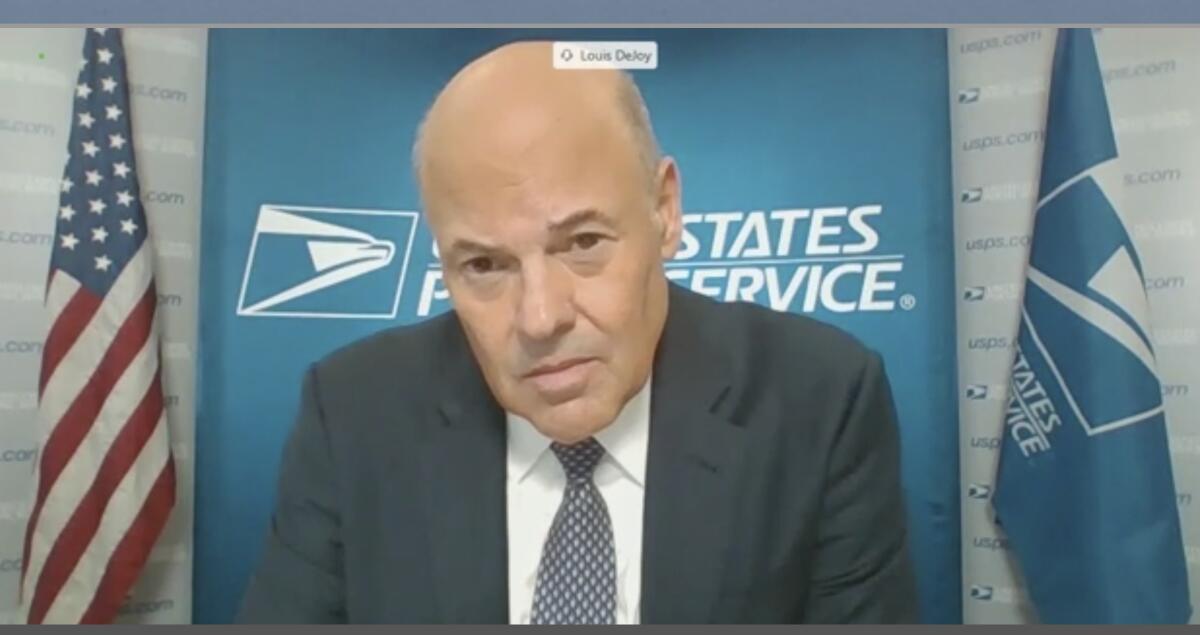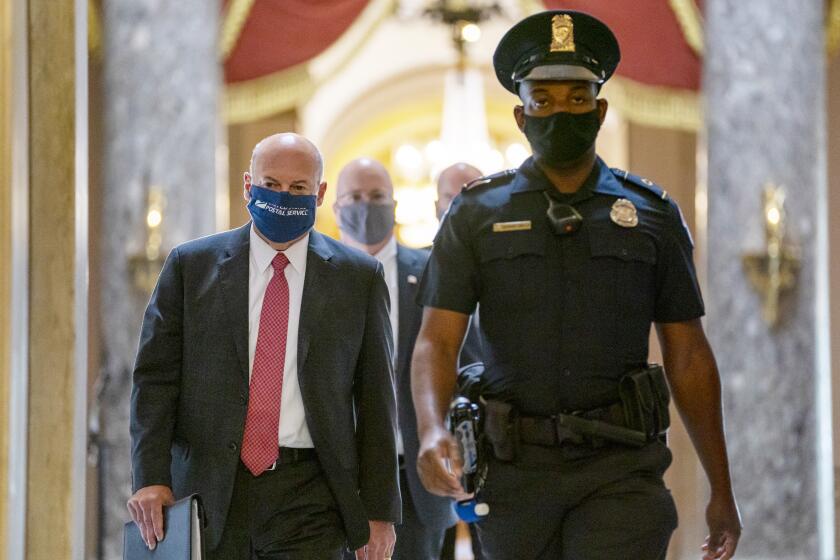Remember Louis DeJoy? He’s still in charge of the Postal Service, but why?

- Share via
For a brief moment in 2020, Postmaster Gen. Louis DeJoy became the face of Trumpian maladministration.
It will be remembered that within weeks of taking office in mid-June last year, DeJoy imposed changes on U.S. Postal Service operations that produced plummeting on-time performance rates.
The decline was so severe that many in Congress and in the nation at large speculated that he had been put in place deliberately to hamstring the delivery of mailed ballots in the upcoming election.
Through the devastating arson of the Trump regime, the USPS Board of Governors sat silent. Their dereliction cannot now be forgotten.
— Rep. Bill Pascrell, D-N.J.
DeJoy himself contributed to this impression with performances before congressional committees that were both defensive and truculent. While acknowledging that he was unfamiliar with the ramifications of his own policies, he belligerently insisted that he would pursue them nonetheless.
Doubts about the Postal Service’s performance during the election have ebbed as the election recedes in the rearview mirror. But complaints about deliveries during the holidays and well into this year have exploded. One thing that hasn’t changed: DeJoy is still in charge of the Postal Service.
That would be hard to explain, given his record, if not for the peculiar structure of USPS governance. DeJoy doesn’t serve at the pleasure of the president, but rather at the pleasure of the Postal Service’s board of governors. In other words, President Biden can’t fire him directly. But he can control the board, the members of which serve staggered seven-year terms.
DeJoy’s name came out of nowhere in the search for a postmaster general
This is probably another case of Biden needing to get around to a task that’s almost certainly inevitable. Of the nine seats on the board, three are vacant and two held by Democrats (including one Democrat in a seat that has already expired). The term of another member, Republican John M. Barger, a Southern California investment executive, expires Dec. 8. It would therefore be routine for Biden to nominate a majority of the board in short order and send his choices to the Senate. Biden hasn’t yet put forth any new names.
The new board — indeed, the members currently in place — would have ample grounds to remove DeJoy, even though the members don’t need a formal reason. Although DeJoy claimed that his operational changes, which included limiting overtime and ordering postal vehicles to start on their rounds according to their timetables before they had been fully loaded, were aimed at cutting costs and improving efficiency, postal operations cratered.
By Dec. 26, nationwide on-time delivery of first-class mail had fallen to 63.9% from 91.8% a year earlier. In some parts of the country, performance was even more shockingly dismal. In Baltimore, for example, on-time delivery of first-class mail fell to less than 30% the day after Christmas.
The USPS pleaded that its operations were hampered by a surfeit of holiday mail and package deliveries for the holidays, as well as the pandemic, which cut deeply into its workforce.
These are explanations, but not excuses. Christmas, after all, comes more or less at the same time every year, and neither the toll of the pandemic in terms of illness nor the extent to which it was driving consumers to online purchases and mail delivery rather than brick-and-mortar shopping was a sudden event or a big secret.
The Postal Service may not have been able to maintain performance at 2019 levels in the face of these challenges, but it should have been able to do much better than it did. Under normal circumstances, an executive who failed to deal adequately with operational challenges, especially those that telegraphed their onset months in advance, would take the honorable course and quit.
Trump is threatening the USPS with privatization, but that’s a terrible idea.
That wasn’t the Trump administration way, however. Its approach was to claim blamelessness, and also to use its own incompetence as an excuse to hollow out federal agencies from the inside even more.
DeJoy’s appointment as postmaster general was shrouded by a miasma of suspicion from the outset. DeJoy had no experience inside the USPS before getting the job. He was, however, a major fundraiser for Donald Trump.
No one was ever quite sure how his name came up in the board’s search for a postmaster; DeJoy wasn’t among the candidates identified by the professional search firm the board had hired.
Rather, he was put forward by board member Barger, who was supervising the postmaster search.
“It wasn’t clear how [Barger] had met Mr. DeJoy to me,” David Williams, a former USPS inspector general and former vice chairman of the board of governors, told Congress last year. “I don’t think anyone was clear on it.”
He said he resigned from the board after it became clear that it was determined to give DeJoy the job — despite a couple of interviews with board members in which DeJoy seemed uncertain that he wanted the job or that he knew what it entailed.
At the second interview, Williams said, Barger “actually helped him finish a number of sentences where he got stuck and in addition to that he explained to the board what Mr. DeJoy meant during the presentation.”
The suspension of changes at the postal service doesn’t end the Trump threat to destroy the USPS
There’s no question that the USPS is facing a crisis that DeJoy has done nothing to alleviate. Last month, Rep. Bill Pascrell Jr. (D-N.J.) called on Biden to fire and replace the entire board to “begin the hard work of rebuilding our Postal Service for the next century.”
Pascrell wrote, “Through the devastating arson of the Trump regime, the USPS Board of Governors sat silent. Their dereliction cannot now be forgotten.”
High on the must-do list should be legislation to repeal the 2006 bill that saddled the Postal Service with a mandate to prefund its retiree healthcare liability. Bipartisan legislation filed this week would do so.
As we’ve reported, the losses sustained by the USPS in recent years have something to do with the decline of first-class mail volumes, but more to do with that mandate. Without that burden, according to the Institute for Policy Studies, “the Post Office would have reported operating profits in each of the last six years” instead of red ink. Instead, “This extraordinary mandate created a financial ‘crisis’ that has been used to justify harmful service cuts and even calls for postal privatization.”
The Trump administration toyed with the idea of privatizing the USPS, which would allow it to jack up rates and link them to distance, so that inhabitants of rural and remote communities would pay more for their mail. That would be an unprecedented and insupportable departure from the centuries-old tradition that the U.S. Mail stands for universal service, binding the nation together as a vast community of equals.
The idea that the Postal Service should somehow be forced to pay its own way, like a commercial toll bridge, is equally at odds with the principle that government exists precisely to provide services that can’t be justified in commercial terms, but are public goods.
Creating a modern role for the Postal Service and placing it back in the panoply of government services where it belongs requires leadership that believes in its mission, not that sees it as a hobbled competitor to FedEx and UPS.
Filling the leadership vacuum of the DeJoy regime shouldn’t be that hard; since he took over last year, he has accomplished barely anything at all.
More to Read
Inside the business of entertainment
The Wide Shot brings you news, analysis and insights on everything from streaming wars to production — and what it all means for the future.
You may occasionally receive promotional content from the Los Angeles Times.













